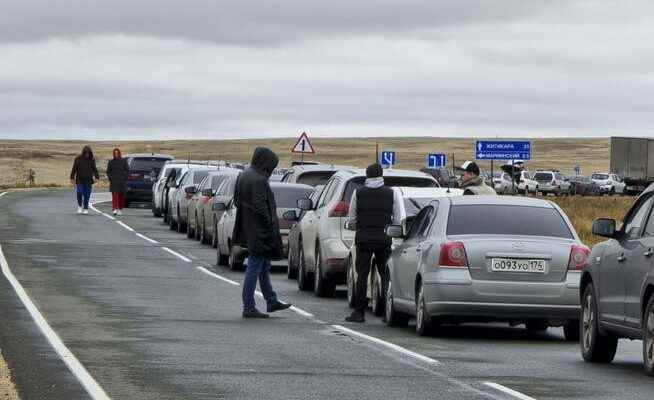The Russian mobilization came as a shock to many Russians: Hundreds of thousands are fleeing abroad to escape from the war effort. The Swiss authorities are closely monitoring the situation.
Fleeing fear of going to war: traffic jam at the border between Russia and Kazakhstan.
Almost 100,000 Russians have fled to Kazakhstan since the mobilization was announced last week alone. At least that’s how the Kazakh authorities put it. But there are also increasing numbers of Russian refugees in Finland who are leaving the country for fear of going to war. The effects on the Central European countries are still difficult to foresee. When asked, the State Secretariat for Migration explained that so far there has been no noticeable increase in asylum seekers from Russia. Since the beginning of the war, an average of just under twenty people from Russia have applied for asylum in Switzerland each month.
But if the situation worsens, Switzerland is faced with the question of the circumstances under which conscientious objectors and deserters should be admitted. This debate has already flared up in many countries. Poland and Estonia, for example, want to keep their borders closed to Russian deserters. In Germany, on the other hand, politicians from several parties have spoken out in favor of making it easier for Russian conscientious objectors and deserters to be admitted.
Asylum to weaken Putin’s army?
In Switzerland, the willingness to do so is likely to be significantly less than in the case of the wave of refugees from Ukraine. First of all, fleeing soldiers are, despite everything, citizens from the country of the aggressors. In addition, there is a certain interest in this country that conscientious objectors do not move to the West, but increase the pressure on Putin as the opposition in their home country. However, there is also the opposite consideration: Every Russian soldier who flees instead of going to war in the neighboring country contributes to the weakening of Putin’s army.
However, such considerations should not play a role in asylum law, explains Alberto Achermann, Professor of Migration Law at the University of Bern: “Asylum law must remain politically neutral.” If you link refugee status to geopolitical considerations, the right to asylum ultimately loses its meaning. After all, wherever people are fleeing for political reasons, a strong opposition would be desirable, explains Achermann. That shouldn’t affect the protection that people who were fleeing received.
After Putin’s mobilization, the SP demanded the reintroduction of embassy asylum for Russian conscientious objectors. Among other things, this was on the grounds that Switzerland had an interest in them not going to war. This should give critics of the regime the opportunity to submit an application for asylum at the embassy, i.e. before they travel to Switzerland. However, the Federal Council rejects this. Russians can apply for a humanitarian visa at the Moscow embassy today, he says. This is granted if “it can obviously be assumed that the applicant’s life and limb are in direct, serious and concrete danger”. However, this usually requires a connection to Switzerland.
It is not clear under what circumstances Russian deserters or conscientious objectors are even entitled to asylum in Switzerland. The SEM points out that conscientious objection and desertion alone are not grounds for asylum. In fact, the law contains a provision that excludes people from being granted asylum who are being prosecuted solely for refusal to work. The background is the debate about conscientious objectors from Eritrea that has been going on for years. This now automatically also applies to deserters from Russia. Conscientious objectors or deserters are only granted asylum in very specific cases.
Conscientious objectors as enemies of the state
According to Achermann, this would be the case, for example, if the state did not pursue the conscientious objection per se, but the political attitude behind it. In this case, there is a reason for asylum. There are clear signs that this is exactly the case, says Achermann: By increasing the sentence for deserters to fifteen years and that for draft evaders to ten years, the country is showing that it regards these people as enemies of the state. Such a disproportionate punishment is an indication of persecution for political reasons. There is also evidence that soldiers are being coerced into committing war crimes by their superiors. The SEM explains that it examines “the circumstances of the individual case intensively and in detail for each application”.
The non-refoulement principle is also relevant for Russians who come to Switzerland, regardless of their refugee status. This principle of international law states that persons should not be returned to a country where there is a serious risk of torture, inhuman treatment or any other very serious violation of human rights. According to Achermann, it is not only the drastic penalties that indicate this. According to various reports, conscientious objectors must expect to be sent to the front with practically no military training.
With last week’s mobilization, the situation for men from Russia has changed drastically. It is currently unclear to what extent Switzerland, as a destination country for refugees, will be affected. The State Secretariat for Migration is aware of the difficult situation in Russia. The latest developments in the situation of Russian deserters and draft evaders are being “closely observed”.
